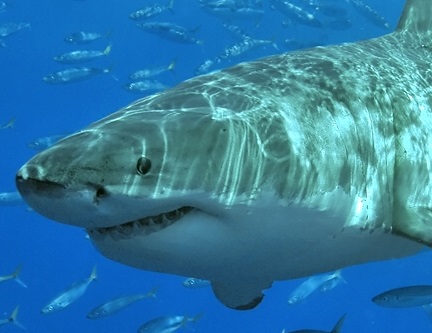Banning humans outright helps depleted shark populations recover faster than simply stopping fishing in affected areas, according to new local research.
However, Dr Justin Rizzari conceded that any attempt to expand “human exclusion zones” would be unpopular, so the alternative was possibly “increased education for behavioural change”.
Dr Rizzari, a Deakin University fisheries ecologist based mostly at Queenscliff Marine Centre, investigated how shark populations had responded to decades-old no-take marine reserves around the Great Barrier Reef.
He compared recovery rates in 11 no-take reserves compared to data from 13 exclusion zones, along with shark counts in 10 nearby reefs open to fishing.
The no-take reserves were “coming up short” in restoring the reef’s shark populations, which were recovering “properly” only in human exclusion zones, he found.
Shark populations were more than double the size in exclusion zones compared to no-take reserves despite both areas banning fishing, Dr Rizarri said.
“The results indicate that restoration of near-natural shark populations requires several decades, but more importantly these results demonstrate the superior performance of human exclusion zones at rebuilding shark populations,” Dr Rizzari said.
“This is important as no-take reserves are firmly advocated as an effective tool to rebuild over-exploited fish and shark populations and to restore natural ecosystems.”
Illegal fishing was Dr Rizzari’s prime suspect behind the decline in no-take zones.
“It’s far easier to police poaching in exclusion zones,” he said.
“Evidence of fishing is needed to prosecute in no-take reserves but is not needed in exclusion zones, so the prevalence of illegal fishing is much lower in these areas.”
But Dr Rizzari said improving the effectiveness of no-take reserves was not easy.
“There’s the option to increase exclusion zones, although that would be publically unpopular,” he said.
“Ideally there could be an increase in enforcement in no-take reserves but that has funding limitations. There’s also the option to increase penalties, but these are often ignored if people don’t think they’ll get caught.”
Dr Rizzari said increased education for behavioural change was possibly the best option.
“We want people to understand where they can and can’t fish, but also to have a better understanding of why that’s the case, and the implications of overfishing.
“Fishing is regarded as an acceptable use of natural resources, provided it’s undertaken responsibly and sustainably.”








